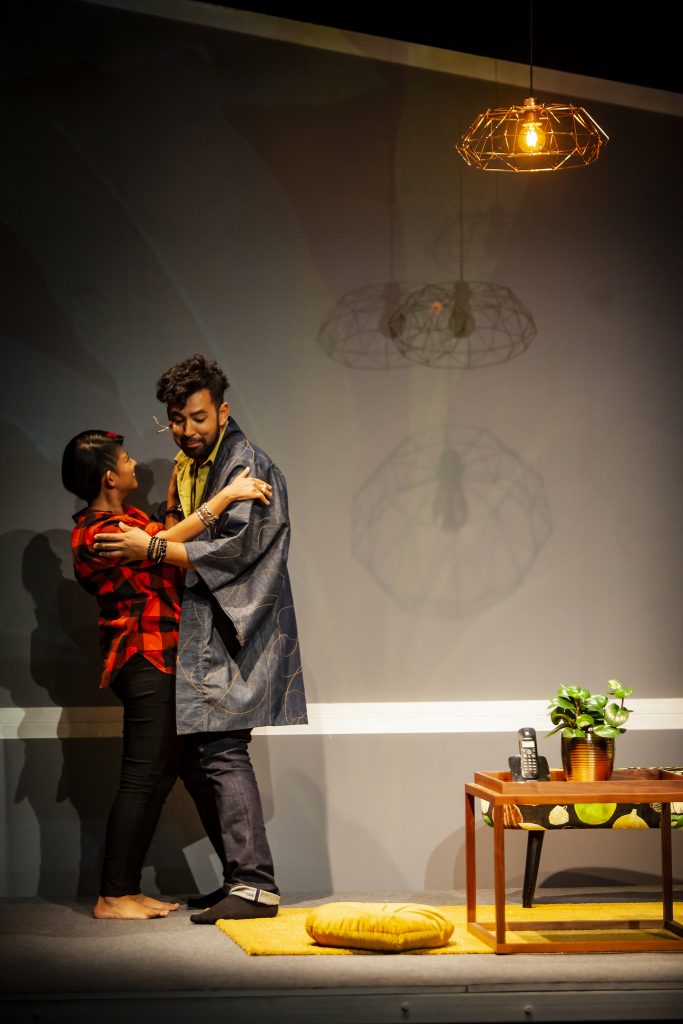- Views4512
- Likes13
Gold Rain & Hailstones
Produced by The Instant Café Theatre Company
Written by Jit Murad, directed by Gavin Yap
1-11 March 2019
Damansara Performing Arts Centre
REVIEW BY VALENTINA TAN
Identity is something that everyone has struggled with. It doesn’t matter if you are old or young, fair or dark skinned. Everyone has been through soul searching and an identity crisis at least once in their lives. Gold Rain and Hailstones visualizes our journey for acceptance, a journey that takes some people halfway across the globe and yet makes them feel like strangers in their own land. For some, it is the choice between becoming a clumsy mutant or an exotic hybrid.
Gold Rain revolves around the four main characters, Man, Amy, Jay and Nina, long-time friends who all pursued their tertiary education in the United States. Amy is about to come home after many years abroad and her much anticipated return becomes the talk of the town. In the play, we follow the characters’ tales of reorientation and the dilemmas faced when things don’t go exactly as planned. This resonated with me: as a previous exchange student myself, I had my fair share of issues and readapting to the world I thought I knew before I left. It’s never an easy transition, but, as the characters of Gold Rain experience, it gets better with time.
Jit Murad’s play, which tackled these issues from almost 30 years ago, remains relevant with the addition of a modern twist with the help of director Gavin Yap. This proves how some societal issues are invariable, rather it is the context which changes with the times.
In addition to that, the connection between the actors was simply electrifying. It was absolutely amazing to see how Farah Rani, Sharifah Amani, Ghafir Akbar and Redza Minhat juggled 16 different roles amongst themselves, breathing life into every single one of their characters. Pausing for the briefest of moments before delivering the comedic punchline, they could have us laughing hysterically one minute, tearing up the next. The 2-hour show was scattered with light moments throughout yet managed to turn serious at times when it mattered.
The set design was kept very clean and minimalistic but powerful enough to supplement the flow of the play. It had more of an innovative polished feel compared to the original production that looked like it employed set and props only out of necessity. On top of that, I appreciate how the cast pulled out all the stops to portray a host of hilarious subsidiary characters.
The play rings true to how we sometimes overlook certain aspects of our identity, filling the boxes that society wants filled. We merely meet requirements and modify ourselves to grow into the constructed identity we wish to portray. Gold Rain represents the internal battles when we try to make sense of ourselves. We see Amy, played by Farah Rani, as the liberal, outspoken feminist who has her views on Orientalism. But to those with a more old-fashioned outlook on life, she is seen as rebellious, difficult to ‘wife up’, with an off-putting reputation to boot. Ironically, her studies abroad make her far more irrelevant than before she left. With the world becoming more accepting of empowered women, characters like Amy are turning out to be quite the norm. As opposed to Jay, a gay man played by Ghafir Akbar who still stands out in society today due to traditional thinking and our culture deeply rooted in religion. His character may even be considered taboo to some, causing him to be ostracized. But social views are malleable; in the battle of perspectives, only time will tell if one day Jay’s character becomes as uncontroversial as Amy’s.
Gold Rain and Hailstones is a story that speaks to you. In the play, we see our fathers warning us of the ways of the world, the friends you met in school whom you are dying to impress, even the Makcik Bawangs who gossip endlessly for the sheer fun of it. Most importantly, we see ourselves longing to belong somewhere, anywhere we don’t have to put up a façade at the end of the day. Yet the biggest obstacle to fully embracing our own identity could be ourselves. Despite the differences between us, there are also similarities. We are all ‘same same but different’. The night couldn’t have ended on a better note than Sharifah Amani’s sanguine assessment: “Not so bad what become mutant? We are the mutant, we should be proud of it.”
Valentina Tan is a cheeky performing arts student who loves surprising people – in a good way! Her motto in life is ‘Air yang tenang, jangan disangka tiada Val’.
All photos by Wong Horng Yih, courtesy of Instant Cafe Theatre.



Awesome read, would love to see more from the critic that wrote this! Very meticulous in the points…
Very entertaining.
A very good read. Felt like I was there at the play itself!